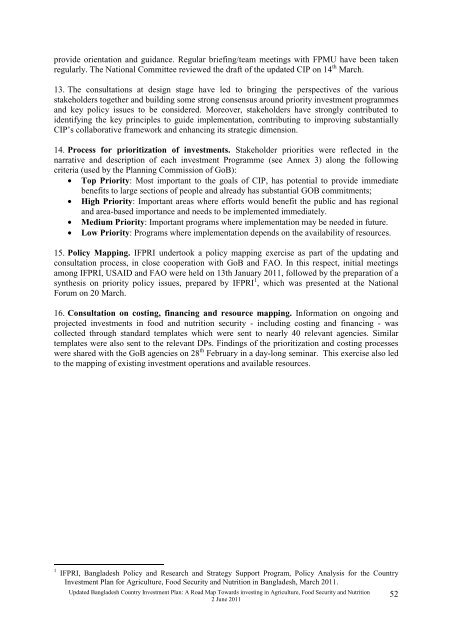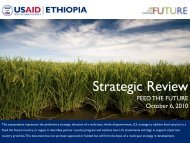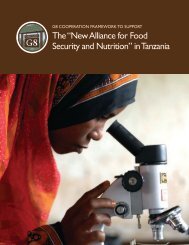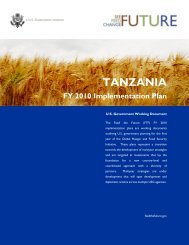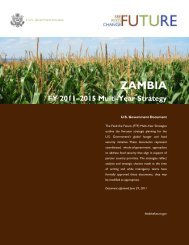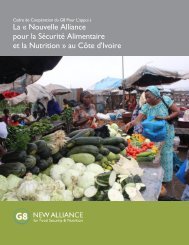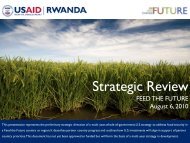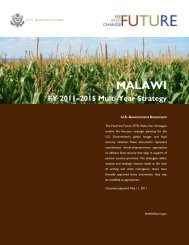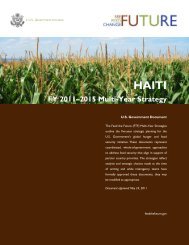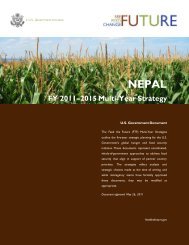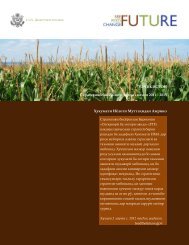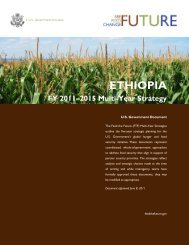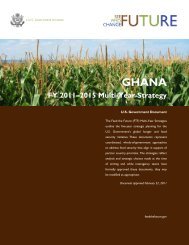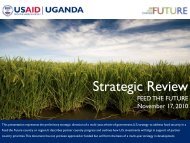Bangladesh Country Investment Plan - Feed the Future
Bangladesh Country Investment Plan - Feed the Future
Bangladesh Country Investment Plan - Feed the Future
You also want an ePaper? Increase the reach of your titles
YUMPU automatically turns print PDFs into web optimized ePapers that Google loves.
provide orientation and guidance. Regular briefing/team meetings with FPMU have been taken<br />
regularly. The National Committee reviewed <strong>the</strong> draft of <strong>the</strong> updated CIP on 14 th March.<br />
13. The consultations at design stage have led to bringing <strong>the</strong> perspectives of <strong>the</strong> various<br />
stakeholders toge<strong>the</strong>r and building some strong consensus around priority investment programmes<br />
and key policy issues to be considered. Moreover, stakeholders have strongly contributed to<br />
identifying <strong>the</strong> key principles to guide implementation, contributing to improving substantially<br />
CIP’s collaborative framework and enhancing its strategic dimension.<br />
14. Process for prioritization of investments. Stakeholder priorities were reflected in <strong>the</strong><br />
narrative and description of each investment Programme (see Annex 3) along <strong>the</strong> following<br />
criteria (used by <strong>the</strong> <strong>Plan</strong>ning Commission of GoB):<br />
• Top Priority: Most important to <strong>the</strong> goals of CIP, has potential to provide immediate<br />
benefits to large sections of people and already has substantial GOB commitments;<br />
• High Priority: Important areas where efforts would benefit <strong>the</strong> public and has regional<br />
and area-based importance and needs to be implemented immediately.<br />
• Medium Priority: Important programs where implementation may be needed in future.<br />
• Low Priority: Programs where implementation depends on <strong>the</strong> availability of resources.<br />
15. Policy Mapping. IFPRI undertook a policy mapping exercise as part of <strong>the</strong> updating and<br />
consultation process, in close cooperation with GoB and FAO. In this respect, initial meetings<br />
among IFPRI, USAID and FAO were held on 13th January 2011, followed by <strong>the</strong> preparation of a<br />
syn<strong>the</strong>sis on priority policy issues, prepared by IFPRI 1 , which was presented at <strong>the</strong> National<br />
Forum on 20 March.<br />
16. Consultation on costing, financing and resource mapping. Information on ongoing and<br />
projected investments in food and nutrition security - including costing and financing - was<br />
collected through standard templates which were sent to nearly 40 relevant agencies. Similar<br />
templates were also sent to <strong>the</strong> relevant DPs. Findings of <strong>the</strong> prioritization and costing processes<br />
were shared with <strong>the</strong> GoB agencies on 28 th February in a day-long seminar. This exercise also led<br />
to <strong>the</strong> mapping of existing investment operations and available resources.<br />
1 IFPRI, <strong>Bangladesh</strong> Policy and Research and Strategy Support Program, Policy Analysis for <strong>the</strong> <strong>Country</strong><br />
<strong>Investment</strong> <strong>Plan</strong> for Agriculture, Food Security and Nutrition in <strong>Bangladesh</strong>, March 2011.<br />
Updated <strong>Bangladesh</strong> <strong>Country</strong> <strong>Investment</strong> <strong>Plan</strong>: A Road Map Towards investing in Agriculture, Food Security and Nutrition<br />
2 June 2011<br />
52


